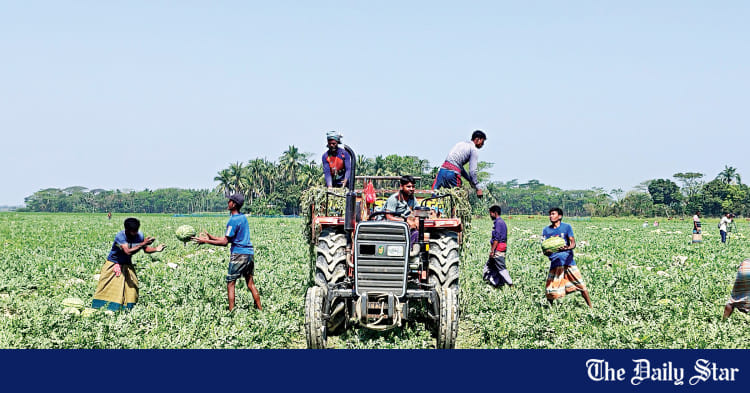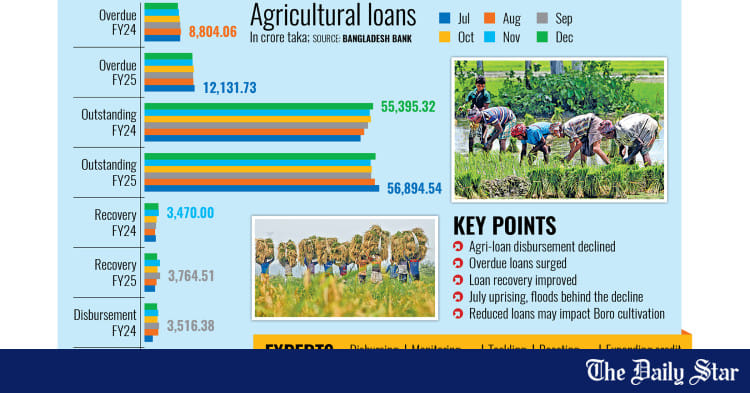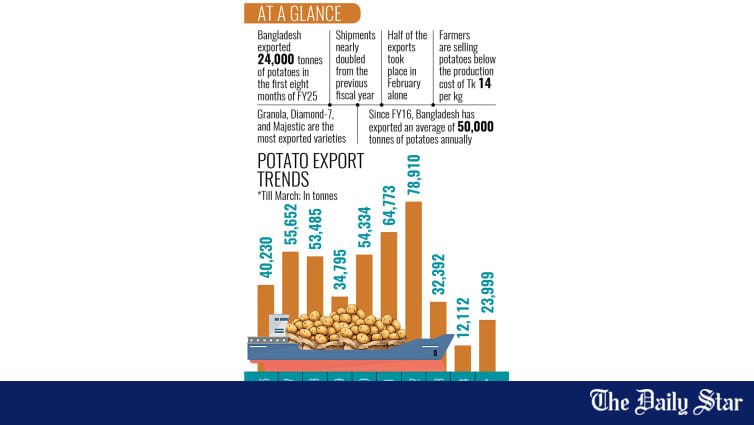Saif
Senior Member
- Joined
- Jan 24, 2024
- Messages
- 15,898
- Likes
- 7,990
- Nation

- Axis Group


Watermelon cultivation surpasses target
Although watermelon cultivation has surpassed the target and farmers are celebrating a bumper yield this season, prices remain three times higher in major cities than at farm-level rates in Barishal—one of the largest watermelon-producing hubs in Bangladesh.
Watermelon cultivation surpasses target
Still costing urban consumers thrice as much as farm-level rates

Workers load watermelons onto a tractor in a field in Charfesson, Bhola. Farmers in Patuakhali and Bhola call the juicy fruit their “green gold”, as no other crop has yielded such high profits in such a short time. Photo: Monir Uddin Anik
Although watermelon cultivation has surpassed the target and farmers are celebrating a bumper yield this season, prices remain three times higher in major cities than at farm-level rates in Barishal—one of the largest watermelon-producing hubs in Bangladesh.
Still, farmers are happy with the prices, while consumers are frustrated at paying exorbitant rates to have the summer delight on their iftar platters.
Supply chain analysis and price comparisons show that it is not the farmers but the middlemen who are dictating the rates, as the fruit changes hands multiple times before reaching the retail market.
Across vast lands in the coastal regions of the southern districts of Patuakhali and Bhola, lush green watermelon fields dominate the landscape.
Farmers there call the juicy fruit their "green gold," as no other crop has yielded such high profits in such a short time.
Across the country, cultivation of the fruit nearly tripled in five years to 226,650 acres in the fiscal year (FY) 2022-23 from 85,500 acres in 2018-19. Accordingly, production rose about threefold to 36 lakh tonnes in FY23 from 13.67 lakh tonnes five years ago, according to the Department of Agricultural Extension (DAE).
Supply chain analysis and price comparisons show that it is not the farmers but the middlemen who are dictating the rates, as the fruit changes hands multiple times
Of the total, Barishal alone supplied around 27 lakh tonnes of watermelon in FY23.
According to watermelon growers in Barishal, favourable weather conditions have led to excellent yields, with larger-sized watermelons available in the market this year.'Green gold'
In Char Meghbhasan village of Char Fashion upazila in Bhola, farmers like Motahar Howlader have cultivated watermelons on 3.2 acres of land with an investment of Tk 400,000. He has already sold his harvest to wholesalers for Tk 650,000 and expects around 5,000 watermelons from his field.
Large watermelons are being sold for Tk 120-130 each, while medium-sized ones fetch Tk 80-100.
Howlader said that as the land does not belong to him, he will have to pay the rent, which is Tk 20,000-30,000 per 1.6 acres, from the sales. Besides, production costs range from Tk 150,000-200,000 per 1.6 acres.
Wholesale watermelon trader Delwar Hossain, who has purchased 48 acres of watermelon fields, said he paid Tk 390,000-420,000 per 1.6 acres.
He expects each 1.6-acre plot to produce 2,400-2,500 watermelons, mostly of large and medium sizes.
Large 8-10 kg watermelons are being sold wholesale for Tk 250-300 each, while medium-sized 4-5 kg watermelons go for Tk 160-170. Hossain said that transport losses, port fees, and other logistics costs contribute to the high retail prices.
Despite relatively lower farm-level prices, watermelons reach Dhaka and other retail markets at three times the price.
In Barishal's wholesale markets, traders like Ganesh Dutta reported selling 7-8 kg watermelons for Tk 350-375, later reaching Tk 450-500 in retail markets.Ramadan demand in price metrics
Similar to Bhola, watermelon farmers in Patuakhali's Galachipa and Rangabali upazilas are expecting profits due to high demand during Ramadan.
In Amkhola village of Galachipa, farmer Barek Mridha (55) cultivated watermelons on 111 acres of land. "I am selling watermelons at an average of Tk 10 lakh per acre," he said.
Likewise, farmers like Md Motaleb Pyada (40) and Bariul Islam (45) in Suhuri village cultivated 74 acres and 37 acres, respectively.
Wholesale buyers from Dhaka have already secured their produce in advance. Large watermelons are selling for Tk 300 per piece.
In Kaukhali village of Rangabali, the region's largest watermelon farmer, Mojibur Rahman (45), said this season's yield is better than last year.
Meanwhile, Kalam Pyada (40) from North Char Montaz village has already sold Tk 15 lakh worth of watermelons and expects another Tk 40-50 lakh in sales.Intermediaries drive up retail prices
According to the Department of Agricultural Extension (DAE) in the Barishal region, watermelon cultivation this year exceeded the target by 4,620 acres. The goal was 118,700 acres, but actual cultivation reached 123,300 acres.
Patuakhali alone accounts for 60 percent of Barishal's total watermelon cultivation, with an increase of 11,735 acres compared to last year.
The average yield per acre stands at 21 tonnes. In Patuakhali, 6-7 kg watermelons are selling wholesale for Tk 240-300 per piece, but retail prices soar to Tk 400-500 per piece.
Shamim Ahmed, training officer of DAE Bhola, said that 3,350 acres of land were used for watermelon farming this year, with similar productivity levels of 21 tonnes per acre.
"In Mojarchar, we found watermelons weighing up to 12 kg, selling for Tk 300 each. In Bhola, watermelons can reach 22 kg, offering significantly higher rates for growers," he said.
Md Nazrul Islam Sikder, additional director of DAE, Barishal region, said that 65 percent of the country's total watermelon supply comes from Barishal.
He said intermediaries at multiple levels significantly drive up retail prices.
"Farmers sell at relatively low prices, but by the time watermelons reach Dhaka, Chattogram, Faridpur, and other markets, the price triples," he added.
Still costing urban consumers thrice as much as farm-level rates
Workers load watermelons onto a tractor in a field in Charfesson, Bhola. Farmers in Patuakhali and Bhola call the juicy fruit their “green gold”, as no other crop has yielded such high profits in such a short time. Photo: Monir Uddin Anik
Although watermelon cultivation has surpassed the target and farmers are celebrating a bumper yield this season, prices remain three times higher in major cities than at farm-level rates in Barishal—one of the largest watermelon-producing hubs in Bangladesh.
Still, farmers are happy with the prices, while consumers are frustrated at paying exorbitant rates to have the summer delight on their iftar platters.
Supply chain analysis and price comparisons show that it is not the farmers but the middlemen who are dictating the rates, as the fruit changes hands multiple times before reaching the retail market.
Across vast lands in the coastal regions of the southern districts of Patuakhali and Bhola, lush green watermelon fields dominate the landscape.
Farmers there call the juicy fruit their "green gold," as no other crop has yielded such high profits in such a short time.
Across the country, cultivation of the fruit nearly tripled in five years to 226,650 acres in the fiscal year (FY) 2022-23 from 85,500 acres in 2018-19. Accordingly, production rose about threefold to 36 lakh tonnes in FY23 from 13.67 lakh tonnes five years ago, according to the Department of Agricultural Extension (DAE).
Supply chain analysis and price comparisons show that it is not the farmers but the middlemen who are dictating the rates, as the fruit changes hands multiple times
Of the total, Barishal alone supplied around 27 lakh tonnes of watermelon in FY23.
According to watermelon growers in Barishal, favourable weather conditions have led to excellent yields, with larger-sized watermelons available in the market this year.'Green gold'
In Char Meghbhasan village of Char Fashion upazila in Bhola, farmers like Motahar Howlader have cultivated watermelons on 3.2 acres of land with an investment of Tk 400,000. He has already sold his harvest to wholesalers for Tk 650,000 and expects around 5,000 watermelons from his field.
Large watermelons are being sold for Tk 120-130 each, while medium-sized ones fetch Tk 80-100.
Howlader said that as the land does not belong to him, he will have to pay the rent, which is Tk 20,000-30,000 per 1.6 acres, from the sales. Besides, production costs range from Tk 150,000-200,000 per 1.6 acres.
Wholesale watermelon trader Delwar Hossain, who has purchased 48 acres of watermelon fields, said he paid Tk 390,000-420,000 per 1.6 acres.
He expects each 1.6-acre plot to produce 2,400-2,500 watermelons, mostly of large and medium sizes.
Large 8-10 kg watermelons are being sold wholesale for Tk 250-300 each, while medium-sized 4-5 kg watermelons go for Tk 160-170. Hossain said that transport losses, port fees, and other logistics costs contribute to the high retail prices.
Despite relatively lower farm-level prices, watermelons reach Dhaka and other retail markets at three times the price.
In Barishal's wholesale markets, traders like Ganesh Dutta reported selling 7-8 kg watermelons for Tk 350-375, later reaching Tk 450-500 in retail markets.Ramadan demand in price metrics
Similar to Bhola, watermelon farmers in Patuakhali's Galachipa and Rangabali upazilas are expecting profits due to high demand during Ramadan.
In Amkhola village of Galachipa, farmer Barek Mridha (55) cultivated watermelons on 111 acres of land. "I am selling watermelons at an average of Tk 10 lakh per acre," he said.
Likewise, farmers like Md Motaleb Pyada (40) and Bariul Islam (45) in Suhuri village cultivated 74 acres and 37 acres, respectively.
Wholesale buyers from Dhaka have already secured their produce in advance. Large watermelons are selling for Tk 300 per piece.
In Kaukhali village of Rangabali, the region's largest watermelon farmer, Mojibur Rahman (45), said this season's yield is better than last year.
Meanwhile, Kalam Pyada (40) from North Char Montaz village has already sold Tk 15 lakh worth of watermelons and expects another Tk 40-50 lakh in sales.Intermediaries drive up retail prices
According to the Department of Agricultural Extension (DAE) in the Barishal region, watermelon cultivation this year exceeded the target by 4,620 acres. The goal was 118,700 acres, but actual cultivation reached 123,300 acres.
Patuakhali alone accounts for 60 percent of Barishal's total watermelon cultivation, with an increase of 11,735 acres compared to last year.
The average yield per acre stands at 21 tonnes. In Patuakhali, 6-7 kg watermelons are selling wholesale for Tk 240-300 per piece, but retail prices soar to Tk 400-500 per piece.
Shamim Ahmed, training officer of DAE Bhola, said that 3,350 acres of land were used for watermelon farming this year, with similar productivity levels of 21 tonnes per acre.
"In Mojarchar, we found watermelons weighing up to 12 kg, selling for Tk 300 each. In Bhola, watermelons can reach 22 kg, offering significantly higher rates for growers," he said.
Md Nazrul Islam Sikder, additional director of DAE, Barishal region, said that 65 percent of the country's total watermelon supply comes from Barishal.
He said intermediaries at multiple levels significantly drive up retail prices.
"Farmers sell at relatively low prices, but by the time watermelons reach Dhaka, Chattogram, Faridpur, and other markets, the price triples," he added.











































